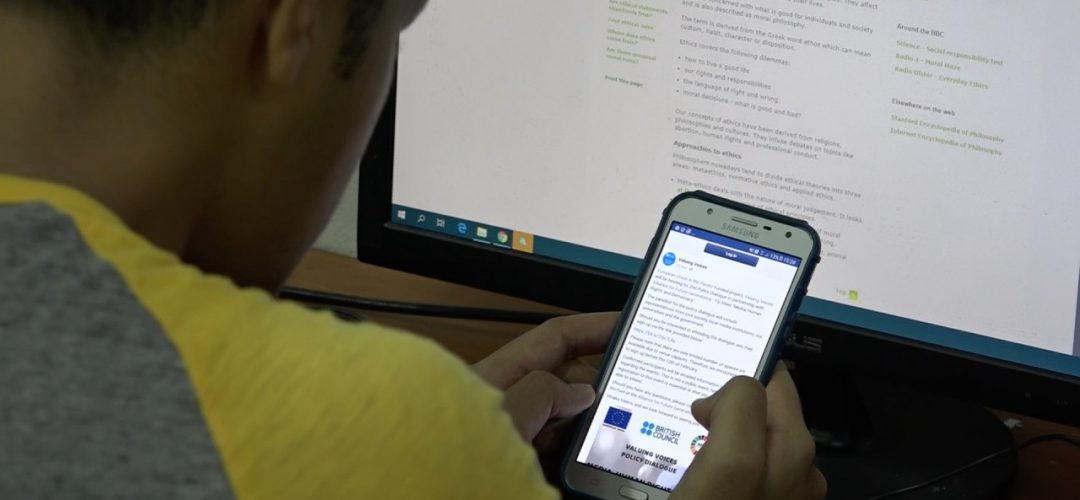Documentary focuses on challenges of parenting in the smart age

A screenshot of the recently-launched documentary film, ‘Parenting in the smart age: Fijian Perspective’ by the University of Sydney and The University of the South Pacific Journalism Programme. Picture: SUPPLIED/ELIKI DRUGUNALEVU
By JARED KOLI
A documentary film highlighting the struggles of Fijian parenting in the smart age has set the tone for conversations about the challenges and responsibilities of new telecommunications.
The recently launched film titled, “Parenting in the Smart Age: Fijian Perspective”, was a collaborative effort by the University of Sydney and The University of the South Pacific Journalism Programme.
The film’s executive director, Professor Heather Horst, said the documentary highlighted the struggles of parenting, particularly in an era where children had access to smartphones and social media.
Prof Horst said they had been exploring ways in which the mobile communication landscape had changed across the Pacific, especially in Fiji, over the past three years.
“The documentary film centers upon themes we heard in our interviews about the experiences parents, children and others have navigating the use of smartphones and social media,” she said.
“Rather than being prescriptive, or a guide for what to do or what not to do, our hope is that the film provokes a collective conversation about the challenges of new communication technologies and the kinds of responsibilities it generates.
“Our project has been exploring the ways in which the mobile communication landscape has been changing since liberalisation across the Pacific, but especially in Fiji and Papua New Guinea.”
USP Journalism coordinator Dr Shailendra Singh said the film was a product of “The Moral Economy of Mobile Phones in the Pacific” – a research project funded by the Australia Research Council.
“The film addresses the following question: How has parenting changed in the smartphones and social media era? We get on with the job of parenting without a second thought, but when you pause and think, the film tackles a really deep and serious question,” Dr Shailendra said.
He said parenting was important, and smart phones added another dimension to the incredibly complex task.
“At this point, let me say that the findings are familiar, yet startling and profound. I do not want to give anything else away, except to say that it’s a really compelling piece of work,” he said.

Picture: SUPPLIED/ELIKI DRUGUNALEVU
Launched at the Oceania Centre for Arts, Culture and Pacific Studies last week, the film was the brainchild of Professor Heather Horst, USP academic staff Romitesh Kant and USP Journalism teaching assistant Eliki Drugunalevu, and took almost 12 months to produce.
A documentary that is sure to “arouse a whole lot of emotions”, the film focused the perspectives of old and young parents, teenagers and youths about the use of mobile phones in Fiji.
With the current access to unfiltered information on social media, some parents had shown great concern about the content their children were able to access on their mobile phones.
A panel discussion convened after the film launch, hosted by leading female activist Virisila Buadromo. The panellists included Save the Children Fiji’s Shairana Ali, Vodafone Fiji head of mCommerce and corporate affairs Shailendra Prasad and Dr Jale Samuwai, who spoke from the perspective of a parent.
Responding to the dangers of social media, Dr Jale said it was the responsibility of parents to be vigilant, create rules for their children and be role models themselves – on mobile phone use.
“As parents, we play a critical role in shaping our children. We should also educate ourselves of the dangers of social media and create a safe space for our kids because children learn by seeing things we do. You have to be a role model if you want your children to follow what you want,” said Dr Jale, a parent of two and recently, the first PhD climate change graduate at USP.
Meanwhile, Ms Ali from Save the Children Fiji said the 234 cyberbullying cases among Fijian high schools students was a grave concern.
Vodafone Fiji’s Shailendra Prasad touched on network safety. He said they were working with police to tackle issues regarding cyberbullying and maintained that the advantages of technology outweighed the negatives.
The documentary film will be available for viewing online soon.
- Jared Koli (Solomon Islands) is a second-year journalism student at The University of the South Pacific’s Laucala campus.

Picture: WANSOLWARA STAFF

Picture: SUPPLIED












